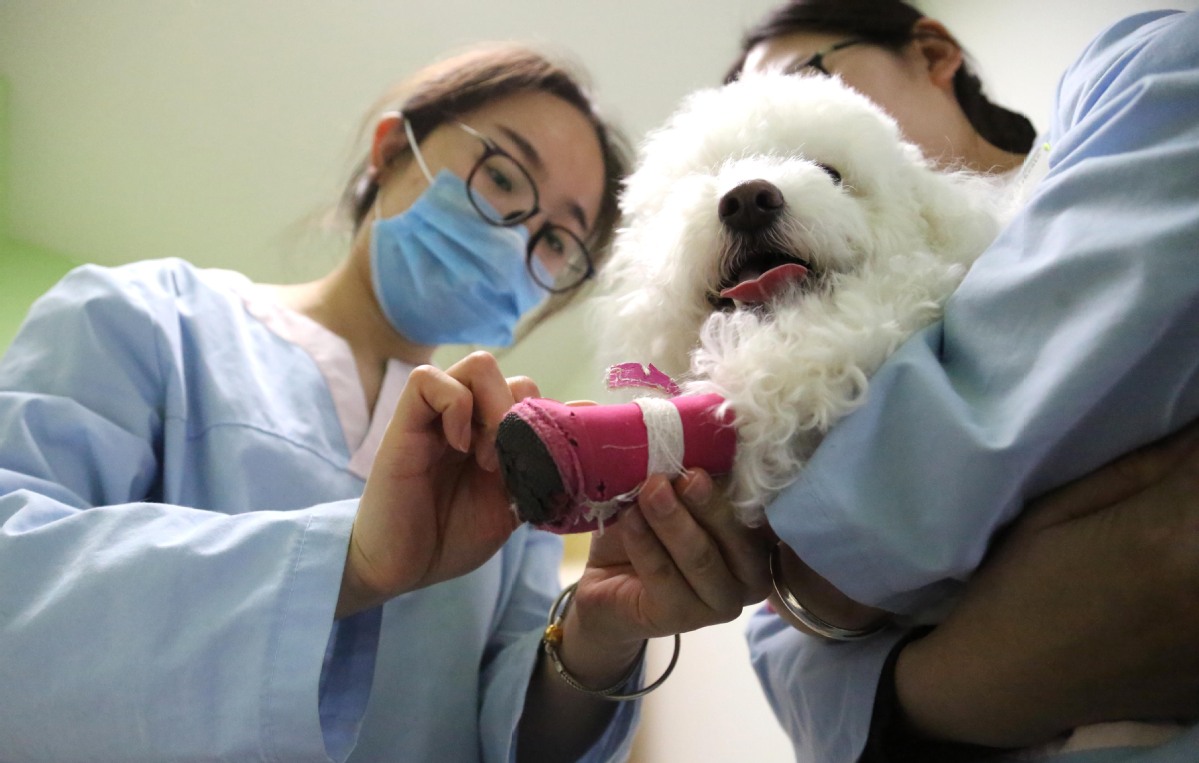Startup hospitals serve furry friends


The pet industry is booming in China. The country's pet market reached 295.3 billion yuan in 2020, up 33.5 percent from 221.2 billion yuan in 2019. The number is set to hit nearly 600 billion yuan by 2023, according to a new report by market consultancy iiMedia Research Group.
Pets such as cats and dogs can help reduce feelings of loneliness and provide companionship for their owners, especially empty-nesters and single people. The report said 37.1 percent of survey respondents regard pets as their friends, and over 40 percent regard pets as their family members.
According to the report, nearly 70 percent of the surveyed Chinese consumers have pets now or kept pets before, and 10.8 percent of the consumers are planning to get pets.
The consultancy found 66.6 percent of pet owners will take pets to get regular checkups. And people's increasingly growing need for petcare is set to create a huge domestic medical market for pets worth 267 billion yuan.
"Having pets means responsibility and caring," said Jerry Jiang, a 31-year-old owner of cats who's based in Beijing. Jiang spends over 500 yuan per month on his two cats, buying them imported food and various toys.
"I'm planning to get more cats in the near future," Jiang said. "Cats are content doing their own stuff without me around and they can take care of themselves most of the time. It's not hard to keep more cute cats at home."
In fact, after years of development. Li Xue, founder and CEO of Loving Care, has found that a growing number of people more willing to raise cats than dogs, especially in southern cities such as Hangzhou and Shanghai.
Seeing the emerging trend in consumer preference for cats, Loving Care has set up separate waiting, treatment and hospital stay areas for pet cats and dogs patients. Li hopes doing so will help reduce stress in cats.
Li believes the key to her hospital's success lies in offering high-quality healthcare services as well as hiring and cultivating more talents.
In 2019, Loving Care spent tens of millions of yuan to build a pet medical center in Beijing. Covering an area of about 3,000 square meters, the pet medical center owns 15 treatment units and 23 major departments. It has been built into a comprehensive pet hospital integrating medical treatment, scientific research, teaching, preventive care and rehabilitation.
"We've spent years on building our internal training system," Li said. "In the next three to five years, we will mainly focus on offering high-quality specialty petcare services. We would like to offer other pet hospitals professional solutions in terms of training, supply chain and diagnosis to help increase hospital quality improvement."
Looking ahead, Li said as pets age, they can develop threatening illnesses and their medical needs will likely become greater in the future. "After years of development, we've accumulated valuable experience and sufficient vet talents, allowing Loving Care to better prepare for the aging of pets. We will continue to open more clinics and hospitals to meet the rising needs to care for aging pets."
Zhang Yi, chief analyst of iiMedia Research, said China's pet economy is still at a very early stage of development.
"The rapid development of the pet economy is fueled by China's rising consumption upgrade," Zhang said. "Seeing pets as part of the family, pet owners are willing to spend more on them. Doing so will boost a wide range of pet-related businesses."
Zhang sees hope in the future development of China's pet economy. He said today's pet-related products and services cannot fully meet pet owners' growing expectations.
As an example, he said pet clinics and hospitals should expand their current offerings to provide regular treatment as well as pet care and health counseling services. More efforts should also be made to improve pets' medical standards.
"We've seen huge growth potential in the pet economy," Zhang noted. "With people's increasing living standards and rising expectations for pet-related products and services, new business opportunities will emerge in the near future."




































